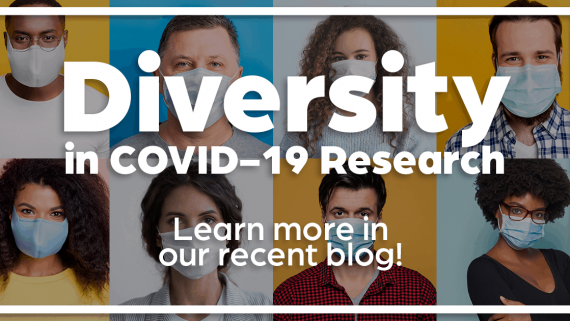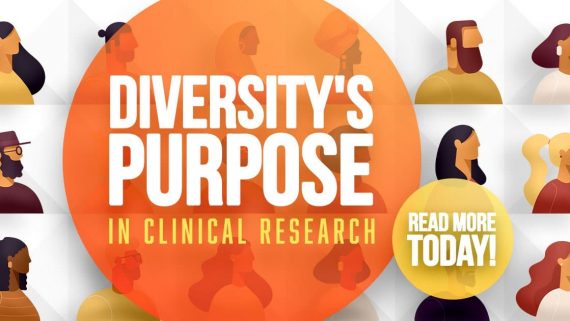As we pass the first anniversary of the first reported case of COVID-19 in the U.S., a lot of uncertainty remains despite the tremendous progress. Diversity has been a challenge long before the coronavirus, and it’s vital to end the disproportionate impact in communities of color. As clinical research efforts continue to deliver new ways to detect, prevent, and treat COVID-19, study participants’ diversity will be more critical than ever.

Importance of Diversity in Research
Genetics and biological makeup differ for every person. For vaccines, this means how antibodies are produced in one ethnic group can vary from others. Since the pandemic began, data gathered shows much higher rates of infection, hospitalization, and death in people of color.
Diversity also covers various age groups, gender, and backgrounds. Older individuals and those with underlying health conditions are more likely to suffer severe symptoms, hospitalizations, and death as well. The populations with the most significant risk stand to benefit the most from the new possibilities being developed for COVID-19. At the same time, they need to be tested in these groups to ensure they are safe and effective for everyone.
Disparity Causes
Historical mistreatment of minority populations in research studies fuels mistrust and prevents some from participating. Though safeguards, ethical laws, and oversight by the FDA have made research studies much safer, the past is still fresh in minds. Others feel they lack the tools to make it to appointments due to lack of transportation, inability to leave work early, childcare needs, and so on. The reality is that many studies offer options to help with those challenges, such as reimbursement for time and travel, transportation help, and extended hours.
By talking with the study office, you can learn more about the study, potential risks, and possible benefits. The commitment for each study varies. A vaccine study may last two years, while an antibody study may be one visit for example. While there are criteria for each that must be met, flexibility of choice is always a bonus. Volunteering in clinical research studies is 100% voluntary throughout the entire process. You can end your commitment at any time in the event you cannot continue.

ActivMed Practices & Research is proud to be a part of history in the fight to end COVID-19. Our site participated in the large AstraZeneca vaccine study, as well as other antibody test studies. Get further details about enrolling COVID-19 studies here.
Without the selfless gift our volunteers offer, the progress made thus far wouldn’t be possible. To learn more about volunteering or view a current list of enrolling studies at each of our sites, visit our website.
References:
https://hub.jhu.edu/2020/11/30/diversity-covid-19-vaccine-trials/
https://www.henryford.com/blog/2020/11/diversity-in-vaccine-trials
When it comes to improving how we detect, manage, and prevent a medical condition, discovering new options is only the beginning. Before it can be made available to the public, each must be thoroughly tested on humans in studies called clinical trials. The diversity in the volunteers who participate plays a vital role in clinical research we can’t afford to do without.
Diversity is More than Race

Diversity means more than a racial or ethnic background. While this is part of it, age, gender, demographics, and lifestyles are others. Why are these things important? Because potentially new drugs, devices, and therapeutic approaches should be studied in the population of people they are meant to help. For example, being over 45 and in specific ethnic groups are some of the factors that increase your risk of developing diabetes.
We could relate these to traditional cuisines or another related cultural custom. We have some answers, but there is still more to learn before an exact cause is found. Diversity makes treatments safer and more effective for everyone.
Diversity’s Role in COVID-19 Vaccine Studies
There are many different types of research studies. Vaccines come to mind as we continue the fight against COVID-19 and marvel as the first vaccines doses are administered. It won’t be available to everyone at first, though. Healthcare workers, older adults (65 and up) and those at higher risk of developing more severe symptoms are among the first groups slated for vaccination. Pre-existing health conditions can put adults of any age at increased risk. Some examples are:
- Cancer
- Chronic kidney disease
- COPD (chronic obstructive pulmonary disease)
- Heart conditions, such as heart failure, coronary artery disease, or cardiomyopathies
- Immunocompromised state (weakened immune system) from solid organ transplant
- Sickle cell disease
- Smoking
- Type 2 diabetes mellitus
- Obesity
COVID-19 Vaccine Studies at ActivMed Practices & Research
There are over 400,000 registry participants in coronavirus related research studies. 19% represent ages 65-74, and 4% are over 75. In a virus where 80% of related deaths are age 65 and older, the numbers are concerning. Regardless of age, volunteering in clinical research allows you an opportunity to ensure the safest and most effective treatments for future generations.

To learn more about the COVID-19 vaccine studies currently enrolling here at ActivMed Practices & Research, contact our Portsmouth, NH location at (603) 319-8863, or visit our website.
References:
https://www.aarp.org/health/conditions-treatments/info-2020/range-of-subjects-in-vaccine-trials.html


